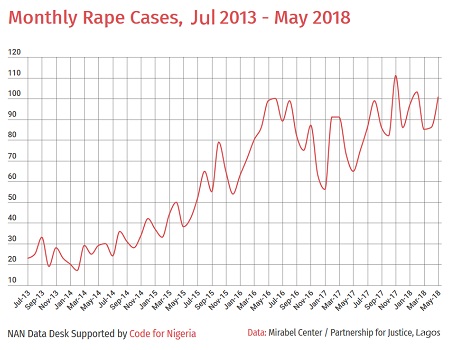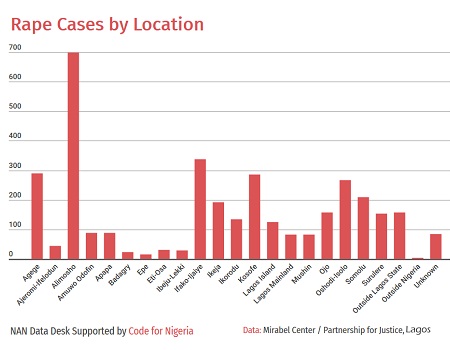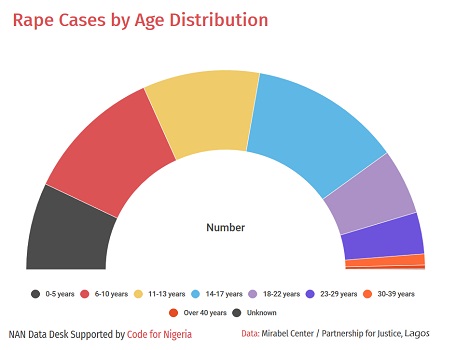
EXPERTS have continued to raise the alarm on the increasing incidence of rape and sexual assault, especially against children and women in the country, saying that 3,577 cases were reported in Lagos State between July 2013 and May 2018.
The experts, who spoke to the News Agency of Nigeria (NAN) on Thursday in Lagos, said that emerging studies on the anti-social behaviour showed that sexual aggression results to grave consequences that could lead to mental, social and physical instability of victims.
A website, lawpadi.com/laws-rape-every-Nigerian-know/, defines rape as “Non-consensual sexual intercourse; when a man has sex with a woman without her consent.
However, in Nigeria’s Federal Capital Territory (FCT), Abuja, only women are capable of being raped.
“Sexual assault, on the other hand, is similar to rape, but is not rape; sexual assault is any form of sexual contact or behaviour that occurs without the explicit consent of the recipient,’’ it said.
Statistics from the Mirabel Centre/Partnership for Justice, Lagos, a Sexual Assault Referral Centre (SARC), says it recorded 3,577 cases of sexual assault from July 2013 to May 2018.
The Mirabel Centre was opened on July 1, 2013, to provide holistic and high quality medical and psychosocial services to survivors of sexual assault and rape in Lagos.
According to the statistics which was provided by the Centre Manager, Juliet Olumuyiwa-Rufai, of the 3,577 victims, 3,501 are females while the males are 76 in number.
A further breakdown of the statistics on the source of clients/information show that 220, were from Police Family Support Unit (FSU) Referrals, 2,557 from Police Non-FSU Referral, 167 from hospitals and 71 from Civil Society organisations (CSOs) and NGOs.
Again, 230 reports came from other government agencies, 325 were walk-in/self-referrals, while 7 were from other unconfirmed or listed sources.

On the locations, Alimosho area was recorded to be the highest at 699, followed by Ifako-Ijaiye with 337 reported rape cases.
Of the types of assaults reported, the data showed rape, attempt to commit rape and sexual assault by penetration, sexual assault by penetration, sexual assault, defilement of child and others, including battery.
Defilement of Child was the highest type of assault at 2,672.
The Lagos State statistics recorded that 879 of the cases were for children from 14 to 17 years and 802 cases for those from six to 10 years.
Those from the ages 11 to 13 were 678, while 505 cases were for the ages 0-five.
For perpetrators, data for clients up to 17 years, the statistics showed that 2,235 of the 3,577 were known perpetrators.
A Consultant Psychiatrist and Founder of the Pinnacle Medical Services, Ikoyi, Lagos, Dr Maymunah Kadiri, said: “ Rape and Sexual Assault are severely traumatic experiences.
“People are taking advantage of children and women because of their vulnerability, poverty and other factors.
“The cases are also under-reported because of fear, the personalities involved and to protect the families’ names.’’
“The effects of rape are dire; it results in identity crisis and other chain reactions.
“Also, it can lead to sexually transmitted diseases, as well as gynaecological and mental disorders,’’ she said.
“According to WHO, women’s health involves the emotional, social, and physical well-being and is determined by the biological, social, political and economic context of their lives.
“When a woman is raped or violated, her biological, social and mental health is bruised.
“Neuropsychiatric disorders, including depressive disorders can set in and if not handled well, can result to low self-esteem, depression, anorexia, low performance in academics and at work, suicidal tendencies and even death.
ALSO READ: Man in court over alleged sexual assault on 2 sisters
“It can result to unwanted pregnancies too.
“Also, if not properly addressed and counselled, the victims may end up hating men and sex; all these are critical issues.’’
Kadiri advised any man, woman or child who had been raped to immediately speak out or report to the parents, nearest police station, hospital, referral centre or even to religious bodies or NGO.
According to her, seeking help early ensures they get adequate medical attention and prompt arrest of the offender.
Dr Joe Okei-Odumakin, President, Women Arise for Change Initiative (WA), said: “The true incidences of rape have been inaccurate and often underestimated.
“This is because most cases of sexual assault are under-reported by the victims due to the associated stigma.
“Young persons below the ages of 20 constitute majority of the victims, with persons known to them being the perpetrators in most cases.

“Research has also shown that about 80 per cent of assaults are done at daytime; teenagers are likely to be raped during the day and non-teenagers at night.
“Threat and physical violence are most likely used to overpower victims,’’ she said.
Okei-Odumakin recommended that efforts on public education and enlightenment on the evils of sexual violence be intensified.
She also suggested the need for special programmes targeting young women and men on how to prevent behaviours that put them at risk of sexual violence to be introduced in schools.
Similarly, Dr Sonnie Ekwowusi, a legal practitioner said: “Women and children are victims of violence and it is fast growing in all forms.
“These forms include rape, gang rape, assault and battering to internet pornography, infanticide and abortions.
“Children and women should be protected because such violence demeans their dignity.
“Laws have been enacted to tackle such problems, such as the Imo State Law of Nigeria Violence against Persons (Prohibition) and the Violence against Persons (Prohibition) Act 2015.
“On June 3, 2016, the 7th Senate passed the Sexual Offences Bill 2015 which prescribes life imprisonment for rapists and those who had sexual intercourse with children.’’
He added: “Beyond these legislations and laws, there should be strategies for implementation of these laws and the establishment of institutional mechanisms that facilitate easy access to the law courts.’’
According to Ekwowusi, this will bring perpetrators of violence against women and children to justice.
He also said that the conspiracy of silence had affected the way violent acts were handled in Nigeria.
“ There is sexual violence in many homes in Nigeria and no one is talking or reporting it because people are afraid.
“ We have to move away from that; to eliminate rape and domestic violence, we must get rid of conspiracy of silence,’’ Ekwowusi said.
Monsignor Gabriel Osu, Director, Social Communications, Catholic Archdiocese of Lagos, said that governments and security agencies were responsible for the inadequacies in the management of many rape cases.
According to him, they do not give proper sanction or punishment to the rapist.
“There must be good legislation to improve punishment of anybody involved in rape cases
“Also, parents and schools are the major people that can teach and train their children on good morals, values, dressing modestly and home training.’’
Osu advised women to stop exposing themselves and dressing half naked in order to prevent themselves from being targets for rape.
He advised religious leaders, schools and parents to continue to teach and preach against rape regularly in their organisations.
“Governments need to provide more law enforcement and improve on the existing laws in order to protect the victims.
1
“Parents and guardians should be more vigilant and also not make their girl-child vulnerable to being victims of rape,’’ Osu said.





